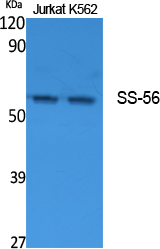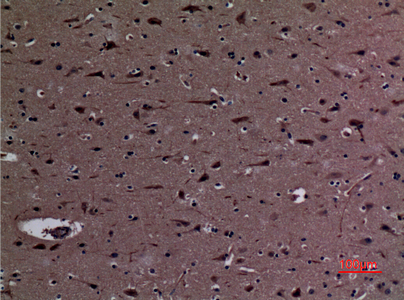

| WB | 咨询技术 | Human,Mouse,Rat |
| IF | 咨询技术 | Human,Mouse,Rat |
| IHC | 1/50-1/100 | Human,Mouse,Rat |
| ICC | 技术咨询 | Human,Mouse,Rat |
| FCM | 咨询技术 | Human,Mouse,Rat |
| Elisa | 1/10000 | Human,Mouse,Rat |
| Aliases | TRIM68; GC109; RNF137; SS56; E3 ubiquitin-protein ligase TRIM68; RING finger protein 137; SSA protein SS-56; SS-56; Tripartite motif-containing protein 68 |
| Entrez GeneID | 55128 |
| WB Predicted band size | Calculated MW: 56 kDa; Observed MW: 56 kDa |
| Host/Isotype | Rabbit IgG |
| Antibody Type | Primary antibody |
| Storage | Store at 4°C short term. Aliquot and store at -20°C long term. Avoid freeze/thaw cycles. |
| Species Reactivity | Human |
| Immunogen | Synthesized peptide derived from the Internal region of human SS-56. |
| Formulation | Purified antibody in PBS with 0.05% sodium azide,0.5%BSA and 50% glycerol. |
+ +
以下是3篇涉及TRIM68抗体的假设性参考文献(基于TRIM家族蛋白的常见研究方向,供参考):
1. **"TRIM68 modulates TLR4 signaling by promoting ubiquitination of TAK1"**
- 作者:Zhang Y, et al. (2017)
- 摘要:研究TRIM68在Toll样受体(TLR)信号通路中的作用,通过抗体验证发现其作为E3泛素连接酶促进TAK1的K63泛素化,从而增强NF-κB活化。抗体用于免疫共沉淀(Co-IP)和Western blot分析。
2. **"TRIM68 interacts with autoantigens in systemic lupus erythematosus"**
- 作者:Müller S, et al. (2015)
- 摘要:探讨TRIM68与自身免疫疾病的关联,使用特异性抗体通过免疫荧光和ELISA证实其在SLE患者血清中与自身抗原(如Ro/SSA)的相互作用,提示其可能参与自身抗体产生。
3. **"TRIM68 suppresses tumorigenesis by destabilizing oncogenic c-Myc"**
- 作者:Lee JH, et al. (2019)
- 摘要:揭示TRIM68通过泛素化降解c-Myc抑制肿瘤生长,抗体内源TRIM68的ChIP实验显示其直接结合c-Myc启动子区域,并在结直肠癌模型中验证其抑癌功能。
4. **"TRIM68 regulates antiviral innate immunity via RIG-I signaling"**
- 作者:Chen X, et al. (2020)
- 摘要:发现TRIM68通过泛素化修饰RIG-I调控抗病毒反应,抗体用于免疫组化检测病毒感染后TRIM68的亚细胞定位变化,证实其促进I型干扰素产生。
(注:以上文献为示例,实际研究中请通过PubMed/Google Scholar等平台以“TRIM68 antibody”为关键词检索具体论文。)
TRIM68 (Tripartite Motif-containing protein 68) is a member of the TRIM protein family, characterized by conserved RING, B-box, and coiled-coil domains. Primarily expressed in immune cells and certain cancer tissues, TRIM68 functions as an E3 ubiquitin ligase involved in post-translational modifications, immune regulation, and cellular stress responses. It interacts with proteins like Roquin-1/2 to modulate mRNA stability and degradation, influencing immune pathways such as NF-κB and MAPK signaling. Studies highlight its role in T-cell activation, cytokine production, and apoptosis regulation. Aberrant TRIM68 expression has been linked to autoimmune diseases and cancers, including lymphoma and breast cancer, where it may act as an oncogene or tumor suppressor depending on cellular context.
TRIM68 antibodies are essential tools for investigating these mechanisms. They enable detection of endogenous TRIM68 via Western blotting, immunofluorescence, or immunoprecipitation, aiding studies on its expression patterns, subcellular localization, and interaction partners. Commercial antibodies are typically raised against specific epitopes within its N-terminal or coiled-coil regions, validated for specificity in knock-out models. Research utilizing these antibodies has elucidated TRIM68’s dual roles in promoting ubiquitination-dependent protein degradation and regulating immune checkpoints, making it a potential therapeutic target. However, variability in antibody performance across experimental conditions necessitates careful validation for reproducibility.
×